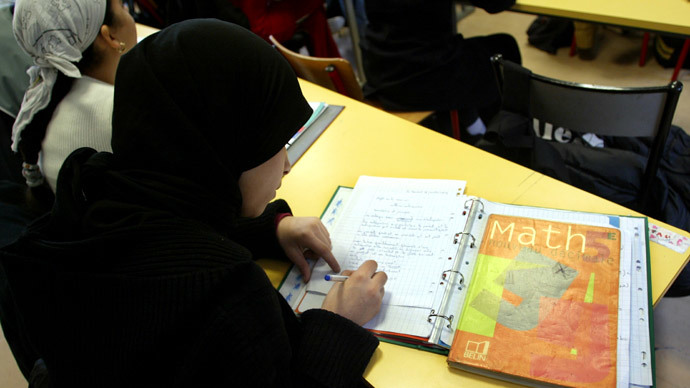‘UK survey: 45 % of Muslim pupils, students faced Islamophobic experience’

A large number of pupils and students in the UK have experienced discrimination and hate crimes while in education, said Arzu Merali from Islamic Human Rights Commission. She added that was before the Charlie Hebdo attack.
RT:We’ve heard recently about the abuse of Muslims in many Western countries. So what is happening in schools in this regard?
Arzu Merali: Unfortunately we’ve got a lot of cases being reported of children mainly in primary school years from the age of 4-5 and upwards having some kind of negative experience - sometimes extraordinarily distressing experiences at school both in the UK and France.
RT:Could you provide any examples of child mistreatment in schools in the UK and France?
AM: There are plenty. We’ve got cases where children in schools are being sort of forced to declare themselves “Je suis Charlie”... We’ve got cases where children are subject to all sorts of questions by classmates and teachers in trying to discuss what’s happened, which puts them in a very awkward position. Rather than everyone trying to make sense of the event afterwards Muslim children are finding themselves pulled out, asked to explain, asked to condemn, being treated differently, and so on. That is all quite alarming. But the thing that is probably more distressing is the cases where there is actual aggression from teachers towards children. We have a number of cases that have been reported which have been quietly divulged because they are not authorized to go into the public domain, suffice it to say that both in the UK and France there has been a number of these cases reported. Sadly, as a long-time campaigner, this type of thing is nothing new.

RT:How serious is the problem of Islamophobia in educational institutions?
AM: Sadly we are looking at a rise in the problems we’re seeing in the educational sphere. Our organization [IHRC] has taken an extensive survey of Muslim experiences in the UK last year. We just got our results in this week and in the educational sphere learned 45 percent of the people who responded to that question, said that they had this kind of Islamophobic experience in an educational setting - be that school or university. That is huge, that is really massive amount of pupils and students who’ve got that. And this was before any kind of incident like the Charlie Hebdo attacks after which there is usually a spike.
What we’ve seen over the many years of recording discrimination and hate crime is that after a spike, although things do settle down, they settle down at a higher level of a silent form of hatred and discrimination which is a kind of low-level discrimination that happens in different settings, be that work or school, etc. So maybe people won’t be physically attacked but they certainly have a negative experience as well as being talked down to or discriminated against, demeaned and so on, and so forth.
RT:What would you suggest that Muslims can do to avoid these kinds of Islamophobic attacks?
AM: Unfortunately, there are a limited number of things that young Muslims can do. I generally advise in times of crisis like this for people to walk around together, not to go out alone and be left alone. But when you’re in a school setting, these things don’t apply. You are very much vulnerable with your peers. And if something is going wrong in a school system, at the end of the day there has to be systematic training in education provision for teachers and so on and so forth to make sure that they have a capacity to deal with a crisis like this, so they don’t either inadvertently become the perpetrators of some kind of hatred or racism, or accidently allow it to happen and not doing anything about it.
After events like these things do calm down, however, they don’t go back to normal where everything was fine. If anything, there is a sort of normalization of anti-Muslim experiences and hatred expressions of ‘anti-Muslimness’. The result of our own survey from last year show that compared to the survey we did in 2011 all negative experiences have increased, and will be releasing some of the figures this week and more in the weeks to come. And that is for the UK and that is very shocking indictment of the way our society is going at the moment.
The statements, views and opinions expressed in this column are solely those of the author and do not necessarily represent those of RT.
The statements, views and opinions expressed in this column are solely those of the author and do not necessarily represent those of RT.












